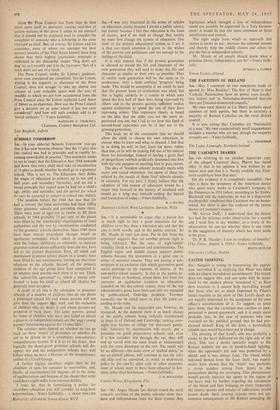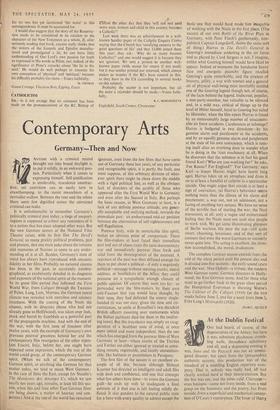EASTER MORNING SIR,—Surgeon is wrong in interpreting the expres- sion
'marvelled if' as implying that Pilate was filled with an almost incredulous astonishment. The Greek does not suggest this, and can quite well be trans- lated by the modern phrase 'wondered if,' as Rieu does translate it. I cannot help marvelling myself that those who are so much impressed by Pilate's initial reaction to the news of Our Lord's death are not equally impressed by his acceptance of his own officer's corroboration of it. To suggest, as some have done, that the centurion was careless or inex- perienced is purest guesswork, and it is much more probable that, in the case of someone who was executed on the political ground that he had pro- claimed himself King of the Jews, a particularly reliable man would have been put in charge.
The piercing of Our Lord's side was probably a stroke to the heart delivered on the right side of the chest. This was a stroke specially taught to the Roman soldiers for use in hand-to-hand fighting, when the opponent's left side was protected by a shield, and it was always fatal. The blood which followed flowed from the heart itself, but experi- ments have shown that the 'water' was probably a serous exudate arising from injury to the pericardium during the scourging. This phenomenon would greatly increase the agony in the region of the heart and, by further impeding the circulation of the blood and thus bringing on more frequently the Manic spasms and attacks of suffocation, would hasten death. Such internal injuries were not un- common consequences of the Roman scourging. So far no one has yet Mentioned 'the water' in this correspondence. It must he accounted for.
I would also suggest that the story of the Resurrec- tion needs to be considered in its relation to the character of the New Testament as a whole, If, after seriously reading that book, anyone really thinks that the writers of the Gospels and Epistles manufac- tured and promulgated a lie, he can have little understanding of Our Lord's own passion for truth as expressed in His words to Pilate, nor, indeed, of the significance of Plato's remarks about 'the lie in the soul.' He would do well perhaps to examine his own conception of 'physical' and 'spiritual,' because his difficulty probably lies there.—Yours faithfully,































 Previous page
Previous page